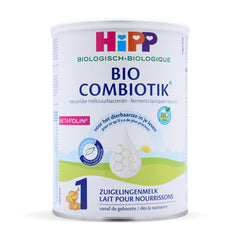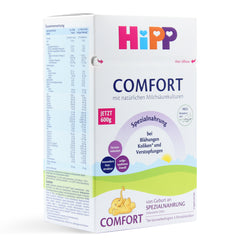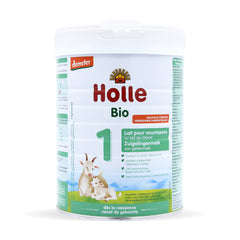When and How to Change Baby Formula: Signs It's Time to Switch
Choosing a baby formula is not a one-time decision, but an ongoing process of observation and adaptation to the needs of a growing baby. Many parents mistakenly believe that once they find the "perfect" formula, it will always be right for their child. However, a baby's body is constantly developing, and what worked perfectly in the first weeks of life may no longer be suitable after a few months.
Understanding how to know when to switch formulas is a critical skill for every parent. Children cannot express their discomfort in words, so closely observing your baby's behavior, digestion, and overall well-being is the only way to understand if their current diet is right for them.
Ignoring the signs that a formula change is needed can lead to serious consequences, ranging from constant colic and sleep disturbances to allergic reactions and weight gain issues. Modern pediatricians emphasize the importance of a flexible approach to infant nutrition.
Learning to recognize warning signs and interpret your baby's behavior correctly means ensuring comfortable digestion, healthy growth, and peaceful nights for the whole family.
Top Signs That Your Baby May Need a Different Formula
There are certain signs that my baby formula needs to be changed that are very important. The signs will help you understand whether the formula is suitable for your baby or if another formula is needed. Here are the key signs and their characteristics:
-
Excessive gas or bloating. Signs may indicate the wrong formula and its replacement. The baby's tummy may be hard and tense after feeding.
-
Diarrhea or constipation. Diarrhea for two days or constipation are the main signs. Parents should change the formula and look at the child's reaction.
-
Skin rash or eczema. When asked "when to change baby formula", rash and eczema are signs to change the formula. It is important to stop redness and manifestations of food allergies in time.
-
Frequent regurgitation or vomiting. The child feels bad after the formula or often regurgitates; these are the main symptoms.
-
Restlessness or colic after feeding. The baby is constantly crying, has colic, and changes behavior.
When parents notice several symptoms over several days, it is important to think about it. Contacting the pediatrician and changing the formula is mandatory for the health of the child.
How to Know If the Formula Is Right for Your Baby
A healthy feeding regimen plays an important role in the health of the baby. Today, parents are interested in "how do I know if the formula is right for my baby?" Here are some facts that are important to pay attention to during and after feeding:
-
Regular bowel movements. The child should not have diarrhea, constipation, or pain during bowel movements. The stools should be of a standard color every day or every other day.
-
Satisfaction after feeding. The child smiles and feels calm and light after feeding. The baby burps little and does not have gas formation or colic in the stomach.
-
Healthy weight gain. The child gains weight evenly in accordance with age norms. Parents should regularly monitor weight gain to understand whether the formula is suitable.
Often, the question "how to know if the formula is right for your baby?" interests parents. It is important to understand that not all fussiness can be associated with the formula. Organic Life Start helps parents make the right choice by offering only proven European organic formulas with natural ingredients. Our consultants are always ready to help you choose the perfect nutrition that takes into account the individual needs of each baby and ensures harmonious development from the very first days of life.
When to Consider Switching Your Baby's Formula
Medical indications and lifestyle are reasons for switching to another formula. The reasons may vary depending on the age and allergic reactions of the child. Fussiness and growth spurts are not reasons for switching to a formula. It is important for parents to understand "when to switch to goat milk formula?" When a child has colic or a bloated tummy, it is important to switch to this particular formula. Here are the key characteristics of the circumstances for changing the formula:
-
Diagnosed with milk protein allergy or lactose intolerance. A pediatrician can establish an allergic reaction that is the reason for switching to a hypoallergenic formula. Often, lactase deficiency or lactose intolerance is another reason for switching.
-
Doctor recommendation. It is essential for parents to consider the doctor's recommendations for another formula. The wrong formula affects the digestion, well-being, and health of the child.
-
Transition to a different feeding stage. The key reasons to change baby formula include the transition between phases. For children from 0 to 6 months and from six months, there are different options for formulas.
Signs That the Formula Isn't Agreeing With Baby
Recognizing your baby's distress signals is a key skill for every parent. Signs that my baby doesn't like his formula can manifest in different ways, and it's important not to ignore these warnings. The main symptoms of formula intolerance are:
-
Constant restlessness after feeding. The baby cries, arches their back, and pulls their legs up to their tummy, indicating discomfort in the digestive system.
-
Stool disorders. Frequent diarrhea, constipation lasting more than 2-3 days, and changes in stool color or consistency signal problems with digestion.
-
Excessive spitting up. If the baby spits up large amounts after each feeding, this may indicate an intolerance to certain ingredients.
-
Skin reactions. Rashes, redness, dry skin, or eczema are often signs of an allergic reaction.
-
Refusal to eat. If the baby turns their head away, pushes out the nipple, or cries when they see the bottle.
Signs that the formula isn't agreeing with the baby require immediate attention and consultation with a pediatrician to find a suitable alternative.
How to Safely Switch Baby Formulas (Step-by-Step)

The transition to another formula can be gradual or immediate. It is essential to understand the difference and how to transfer the child to the formula properly. A gradual transition period helps to avoid many problems and bloating. Often, parents use a special bottle and a good transition plan. Severe allergic reactions and communication with a pediatrician can be a quick solution to changing the formula. Here is what is essential to know when asking the question, "how to switch baby formula to another formula?":
-
Day 1–2: 25% new, 75% old. Parents use a quarter of the new formula and 75% of the previous formula. It is essential to monitor the baby's appetite and health at this time.
-
Day 3–4: 50/50. On the third and fourth day, it is important to use the formula in one-to-one proportions. Monitoring the reaction will help to understand whether the transition is correct or requires adjustments.
-
Day 5+: full transition. On the fifth and other days, parents should replace the old with a new formula. Often, when a baby has a reaction, a one-to-one ratio is used. This transition will help you understand how to switch your baby's formula.
Is It Okay to Change Formula Brands or Types Often?
Changing the formula to a high-quality and natural formula for the child's health is important. Parents often wonder which formula is the best option. It is important for parents to familiarize themselves with the question "can you change formula for the baby?" The formula can be changed, but not often if there is no need for this. When switching from six months on the recommendation of a doctor, it is important to consider several points.
Parents should not change the formula just because of their preference. Sudden colic or slight restlessness in the child is normal. Constant monitoring of the child's digestion, stool, and health is mandatory. A sudden transition to another formula for no reason can create some discomfort. The question "how to know when to change formulas?" is mandatory for all parents. When a child feels unwell, colic, bloating, or other symptoms are reasons to switch to another formula.
Specialized Formulas: When Regular Options Don't Work
Specialized formulas are the best option for the transition; there are different options with nutrients and beneficial substances for each child. Often, children with reflux, allergies, and protein intolerance need the right formula. Parents can understand "how to know if baby formula needs to be changed?" by the child's condition. Here are some examples of good formulas with different compositions:
-
Hypoallergenic. Formulas with a reduced lactose content. The formula is best for easy digestion from six months. The formula helps with lactose intolerance and improves digestion.
-
Sensitive. Formulas have a reduced lactose content and are suitable for sensitive children. Often, the formula is used for easy digestion for children from 0 to 6 months.
-
Based on soy or goat milk. Understanding the signs baby isn't tolerating formula, parents will be able to make the right choice. Goat milk formulas are the best choice for children. The formula is free of soy, gluten, and GMOs and is made from goat's milk.
Talk to Your Pediatrician Before You Switch
Before changing the formula, it is important to talk to your pediatrician and doctor. Specific health concerns or the child's transition age are signs. Often, the child may experience discomfort, colic, and abdominal pain. These symptoms are signs of changing the formula. Obvious signs that the baby needs a different formula require a quick solution to the issue. The pediatrician will help examine the child and recommend a good formula. Skin rashes, eczema, and redness are signs. The child may regurgitate and have constant vomiting due to harmful elements in the formula. Often, the child refuses to eat and is constantly fussy.
A feeding diary is essential for the pediatrician to understand the situation. Each parent should keep a diary and record the child's health. The formula used, the volume and frequency of meals, is mandatory. The pediatrician will help clarify "when to switch formula" and recommend a good one. The diary should also contain records of the child's feelings, crying, and sleep. Observation is a reliable way for a doctor to understand what is wrong with nutrition.
Final Checklist: When and How to Change Baby Formula

Responsible parents understand the symptoms of changing a baby's formula. The key list will help clarify the issues that are important to discuss with the pediatrician. Every child is different and has different characteristics in their body. Choosing a formula is part of learning the behavioral characteristics of the baby. As parents, it is essential to trust your instincts associated with love for your child. Here is when to switch formulas:
-
Persistent digestive upset. The child has persistent digestive upset and is constantly fussy. Gas bloating and colic are the reasons for changing the formula.
-
Skin reactions. The child has rashes and allergic reactions on the skin. Eczema, dry skin, and irritation are symptoms of changing the formula.
-
Doctor recommendation. The pediatrician's recommendation is the most important for changing the formula for the baby.
-
Trying a specialty formula. It is important for parents to pay attention to lactose-free, hypoallergenic formula or a formula based on goat milk.
-
How to transition. Understanding the signs to change baby formula, parents can gradually switch to another formula.
Where to Find Quality Baby Formulas (and What to Look For)
Quality and safety are the most important for customers. Every parent who cares about their child should choose the best. The quality of the formula helps to improve the overall condition and health of the baby. Reputable brands provide high-quality organic European formulas. Proper certification and familiarization with the rules is a guarantee of safety. When parents notice signs to switch baby formula, they turn to reputable brands.
It is possible to choose a formula in stores with organic and hypoallergenic composition. Often, a formula based on goat milk is a good choice for babies with lactose intolerance. Parents can choose the options available online and enjoy the health of their baby. Checking the labels with ingredients will help you familiarize yourself with the products. A high-quality product will guarantee the health and well-being of the child.
Organic Life Start is committed to providing accurate, reliable, and trustworthy information to parents and caregivers. We carefully choose credible sources and follow a meticulous fact-checking process to uphold the highest standards in infant nutrition and parenting advice. To learn more about our dedication to accuracy, please explore our editorial guidelines.
Link To Sources











Grace Lopez -
It was difficult for me to acknowledge that I needed to modify Kirby’s formula; however, I relied on my maternal intuition. Before I implemented any modifications, I acquired a wealth of knowledge regarding the symptoms and verified that they were adequately addressed with our pediatrician.
Vernon -
January 18, 2026
I continue to sense the anxiety and uncertainty I experienced as a mother contemplating the appropriate time to transition Aliondra’s formula. The decision was burdensome because she appeared fine some days, and her stomach spoke a different story. Learning to watch for small signs like discomfort after feeds or changes in her stool helped guide me more than the clock ever did. Switching, I’ve come to understand, need not be a terrifying or hasty process if approached cautiously and methodically. The crucial factor was trusting my intuition as her mother. Ultimately, the knowledge that Aliondra felt more secure and satisfied confirmed that addressing her needs was the appropriate choice.
Colleen Thai -
December 27, 2025
I had no idea that subtle signs like changes in poop consistency or fussiness during feeding could affect my baby’s digestion and comfort so much!